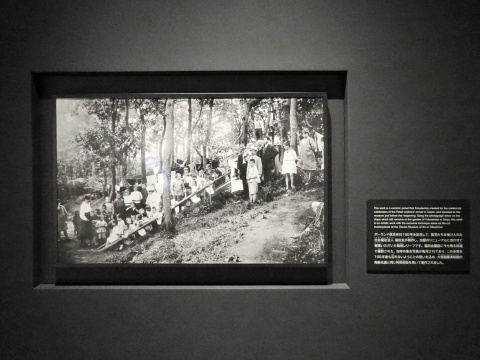At the "Port of Humanity Tsuruga Museum" (Tsuruga City, Fukui Prefecture), which was reopened on November 3, a ceramic board made to commemorate the 100th anniversary of the arrival of Siberian orphans in Japan was installed.
 "Relief commemorating the 100th anniversary of the arrival of Siberian orphans in Japan" (ceramic board size: H:728 x W:1200 mm) donated by the social welfare corporation Fukudenkai to Tsuruga City
"Relief commemorating the 100th anniversary of the arrival of Siberian orphans in Japan" (ceramic board size: H:728 x W:1200 mm) donated by the social welfare corporation Fukudenkai to Tsuruga City
Siberian orphans (Polish orphans) are Polish children who lost their families in Siberia during the civil war after the Russian Revolution. The Japanese Red Cross Society carried out relief activities from 1920 to 1922 (Taisho 9-11) and accepted orphans at several facilities. Fukudenkai, a social welfare corporation that still operates welfare facilities such as orphanages, is one of those who received orphans, and accepts 375 children who landed at Tsuruga Port in 1920 (Taisho 9). Tsuruga Port was developed from the Meiji era to the early Showa era as an international port connecting European cities and Japan via the Trans-Siberian Railway.
Pictures of the children who spent at Fukudenkai are printed on the ceramic plate produced this time. Now, 100 years after the orphans landed in Tsuruga, this ceramic plate was made by the Fukudenkai and donated to Tsuruga City with the idea that "don't forget the historical facts about orphans 100 years later."
In addition to the Polish officials, the renewal opening ceremony was attended by ambassadors to Japan from Israel, Lithuania, the United States, and the Netherlands, renewing the feelings of those who have contributed to humanitarian assistance. A ceramic board is used to continue to convey the history of the connection between Japan and Poland and the thoughts of many people involved in this history.
For more information on "Port of Humanity Tsuruga Museum" and "Fukudenkai", please see the website below.
■ Port of Humanity Tsuruga Museum
23-1, Kanegasaki-cho, Tsuruga-shi, Fukui 914-0072
https://tsuruga-museum.jp/
■ Social welfare corporation Fukudenkai


